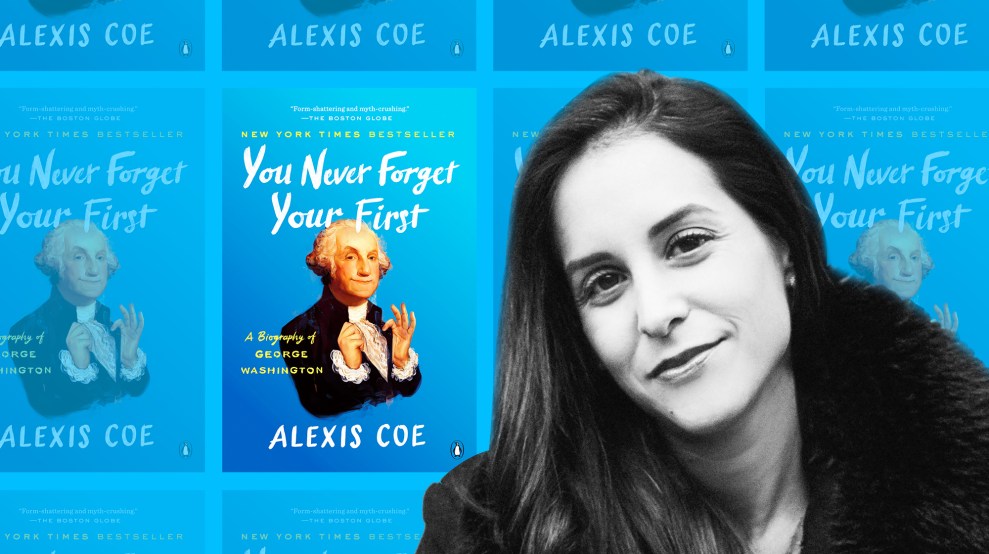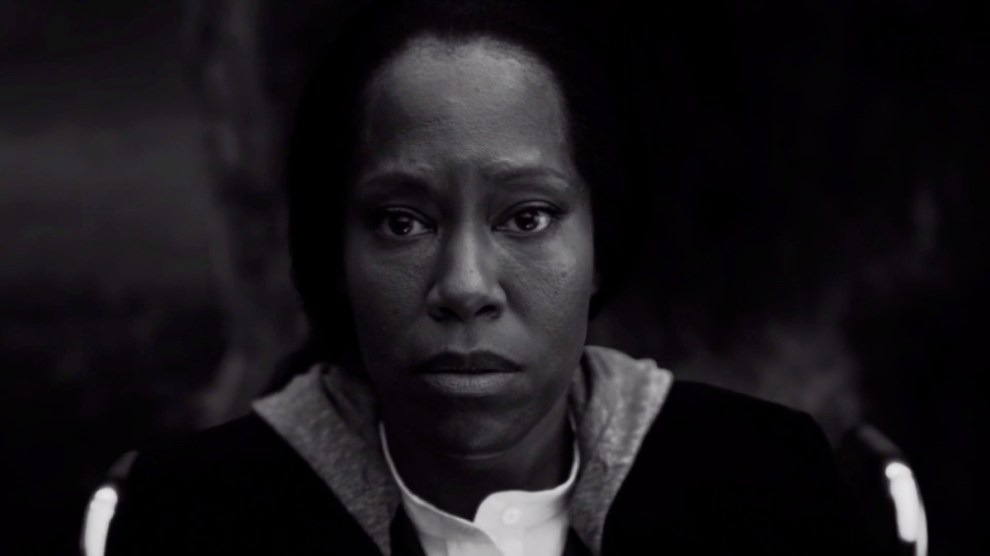
Mother Jones illustration; Viking; Sylvie Rosokoff
I admittedly wouldn’t call this a typical summer beach read, but I’ll say this: The book to read this summer when you need a break from all that new social interaction is about George Washington.
But! I promise it’s not a typical Washington tome. Rather, it’s the one for the moment. When historian Alexis Coe and I caught up earlier this year, when her irreverent but thoroughly researched biography of the first president, You Never Forget Your First, was coming out in paperback, she told me, “On almost every page, there’s something about slavery.”
For better or worse, there’s been a bit of a spoonful-of-sugar reaction to the book’s coverage—as if Coe has a personality and way of writing that balance out the real stuff somehow. It’s true, Coe’s humor is irresistible—I will never forget the phrase “the thigh men of dad history” as long as I am on this earth—but the power of her book lies in her dogged pursuit of the stories that belong to those who surrounded our first president, those who historically have been either portrayed using racist and sexist cliches or ignored altogether.
The issue, at least in part, is the people who have written that history, the vast majority of whom are white and male. “The way they all talked about women was odd,” Coe told me of the many (many, many) men who have written presidential biographies of Washington. “When I would look at the citations, sometimes there weren’t any, which is really curious. And other times, they’d be citing [Ron] Chernow or each other or Chernow often cites himself.”
For instance, descriptions of Mary Washington, George’s mother, were particularly grating: The words “crusty” and “shrewish” were used by Chernow in his famous biography of the first president, without evidence to support those characterizations. Mary is also alleged to be illiterate by some of these male historians, which Coe’s research proves is completely incorrect; she devoutly read her Bible, making notes in the margins, and she wrote letters to her son.
What further sets the book apart is how Coe delves into Washington’s slaveholder status and examines Mount Vernon as a forced labor camp, intentionally keeping that context threaded through the book. “Washington became an enslaver at the age of 11; that was his longest-held title. We think of him as the general and president, but we also have to think of him as master,” she says. “When I look at what his days were, we know, whether [slaves are] mentioned or not in every single letter, in every single diary, or ledger, we know they’re there.” Without them, Washington’s legendary status would not exist, and still, they are the people who are erased from his history.
In the end, Coe does not attempt to gloss over the gaps in knowledge about the women in Washington’s life, or the enslaved people who made his life possible. Rather, she uses the lack of information to drive home how their humanity was ignored. I talked to Coe about this way of reading between the lines, how she portrays Washington, the entire person, and how we need to more fully understand the power dynamics of race, sex, and class in Washington’s personal life and as a component in the founding of this country. This conversation has been condensed and edited for clarity.
I apologize, I don’t have the self-restraint to not start with the “thigh men of dad history.”
It’s OK, no one does.
Could you tell us a bit about them and the sort of book they write?
Washington’s body was very important in early America—he was taller than everyone else, he was graceful, he moved like an athlete. That seems to be what they’re struggling to describe. His body itself survived so many diseases, and it taught him lessons that would help him later. He got smallpox when he was a young man, and then he learned about vaccination and inoculation, and that’s how we basically got through the first season of the Revolutionary War. Instead of talking about all that stuff, they would spend like 20 minutes describing his body in ways that you would find in a romance novel.
These books are so long. I call them the “thigh men of dad history” because “dad history” is like what you see at Barnes & Noble or your local bookstore on Father’s Day. They’re these big tomes—they’re Chernow, they’re Joseph Ellis, they’re all these people—and they would describe the way his thighs moved, and the way they grip the flanks [of horses], and it’s not like they were just obsessed with his thighs, but the way that they talked about them, in particular, was just so odd to me. I’ve never seen it in anything else. Andrew Jackson was also known as having a really able body and there were other presidents who have been athletes, but the hero worship was out of control. So I started in my own head calling them the “thigh men of dad history,” hoping to come up with a better term, and I had it in brackets and then my second readers and my editor all loved it, so that’s how that happened.
This brings us nicely into your critique of how the women in Washington’s life have traditionally been depicted. How did you set out to represent them fairly—and by fairly, I mean not sexist?
Obviously, I love presidential history, and there are problems throughout, but if you read Washington biographies, there’s what we call consensus history. It’s almost like [the famous male biographers] had an outline and their only options were “I’m going for a 500-page book” and “I’m going for a 1,000-page book,” but they all went about it in the same way and that irked me.
Mary Washington, his mother, was described in this way that was so odd—there were words, again, that seemed more like a romance novel than a presidential biography, words I would never use professionally. For example, “crusty.” They would make up these things about her because they were really attached to the story that he hated her, and so everything had to fit in this narrative. One of the things that really struck me is that they cast her as illiterate. Of course, I’m a historian, and so much is digitized—presidential history, especially founding history gets a ton of attention—and so I immediately saw that there were letters to and from Mary Washington, and I knew from visiting Mount Vernon that they had Bibles. I thought, “OK, she’s not illiterate. A couple of things must be going on here: They either have absolutely zero interest in her, which means they don’t have a lot of interest in women, or this is a class judgment.” It’s probably both. I think they were saying she was not on par with Martha Washington, who was widowed young; she was the richest widow in Virginia, she read novels, she had tutors.
Mary Washington was born to an indentured servant and her son was the first president of the United States. He defeated the British at their height, and to me, that’s an American story, and certainly, one we can hold onto better than the Washington they presented, who they do all say is a marble man, but he’s too great to be real. I just knew I had to start over and I couldn’t take anything for granted.
It makes you wonder why it took so long for a book like this to come out that has more nuance and doesn’t rely on those tropes.
Presidential history is male-dominated. When women and people of color were allowed in academia, when they had their work published, they had a very big job, which was to write all the stories that had been excluded. Presidential history, and in particular Washington history, is not very welcoming to any voices that are different. I love Mount Vernon, but I also have really big issues with it. People like Erica Armstrong Dunbar, she was snubbed constantly, and she wasn’t nominated for the Washington Prize, even though she has the biggest book and it’s going to be a movie. I recently read about my friend Marcia Chatelain, a Georgetown professor who went on a tour of Mount Vernon, and slavery was not mentioned once. At the time of his death, Washington owned 223 people.
There’s just not a lot of diversity. And when you don’t have diversity, you don’t have a diversity of stories or approaches, and [our understanding of history] has suffered as a result.
You took great care with the stories of those who were enslaved at Mount Vernon. What were the writing and researching processes for that like?
Look, this makes everyone uncomfortable. There is no one who is comfortable talking about slavery—that’s a good thing. But there’s this pattern in particular with the founders, and all presidents who owned slaves, where biographers tend to save it for a chapter. It only comes up once in a while.
Washington became an enslaver at the age of 11. That was his longest-held title. We think of him as the general and president, but we also have to think of him as master for 56 years of his life, which was 67 in total. When I look at what his days were like, we know they’re there. We know they’re doing everything for him. They’re doing his hair, they’re putting on his jacket, they’re coming in to light the fire at four in the morning.
Yeah! And so, to me, in order to write an honest biography, that’s what needed to happen. On almost every page, there’s something about slavery. People who want to cancel George Washington think that’s not enough and there are many people who think that I just absolutely hate him. My goal was to reflect his world as accurately as possible.
And there are a whole lot of [enslaved people] whose first names we know and not a whole lot more. I made choices, like calling Mount Vernon a forced labor camp, which definitely pissed off a lot of Washington scholars, but it is accurate. Calling it a plantation makes you think of something genteel—people drinking sweet tea on a porch—and that is not what it was. That was happening for three percent of the population at Mount Vernon, and the rest lived in tatters. They were hungry.
Then there’s this line where [biographers] will say, “Oh, he had a change of heart.” I don’t think that’s true. What Mount Vernon biographers say is that he started talking about [slavery as a moral issue] in letters and he felt really stuck, and there’s nothing he could do. That’s not true. I do think the revolution took him out of Virginia and put him all over the country. It put him in proximity to people like the Marquis de Lafayette, who came over from France—he was an abolitionist, and he would write to Washington and so Washington understood the tide was turning, and slavery had become illegal already in London. But he didn’t do anything. He wrote letters once in a while and said, “You know, Lafayette, you’re so sweet, that says so much about you. Let’s talk about it during your next visit, which is happening in five years.” And during that time, he would sell someone. He would assault someone for not being able to move an entire log by themselves. People died, babies were born. We don’t know much, but we do know this: He didn’t emancipate them. He did set up a plan for them in his will, but he did not emancipate them in his lifetime. Other founders did.
What do you think are the biggest misconceptions out there about George Washington? What really surprised you?
The thing is, Washington was a real human. He had good days and bad days, flaws and nice things about him. I think probably the most unexpected is what a good dad he was. He didn’t have biological children, but Martha came with two young children and that didn’t matter. There wasn’t much emphasis on the lack of biological connection. As busy as he was winning a war and being president and doing all these things, he would write so many letters to tutors, to kids; he would lecture people about losing their umbrellas—the amount of detail to his involvement with the children really humanizes him, I think.
We also think of him as the general, and Washington did a lot of retreating during the war. There’s a reason it went on for almost eight years, and it wasn’t just that we were totally overpowered. He made some mistakes too; he’s not perfect. But he doesn’t get enough credit for the war of public opinion that he launched during the war. And he doesn’t get credit for how much giving up power made America seem stable, and really steering that ship into port. He didn’t want to be president, but he took that on.
So I think he really had this relationship with power that for 233 years really set us apart from every other country, until lately. And I think that really was essential to us—that’s why we have to study him, because he’s at our core.
And then there’s fun stuff like he was obsessed with mules. He really wanted to breed them. He loved dogs—he named them Sweetlips. And when he was young, he was out for any rich young lady. He didn’t seem very choosy, as long as they had a substantial dowry.







